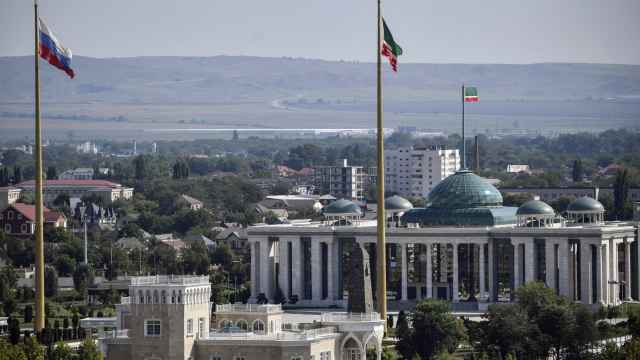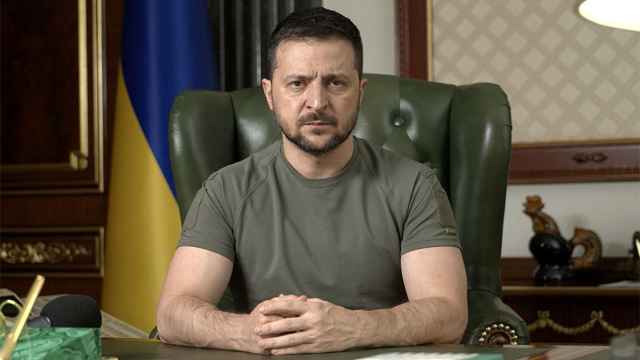
Alexei Pankin
While I was attending the World Newspaper Congress in Kiev in September, one of the heads of UNESCO asked me, "Aren't you frightened of living in a nation whose president throws dissidents in jail?" When I realized that he was referring to Pussy Riot, I laughed so hard that I could hardly pronounce the words, "They aren't dissidents, but exhibitionists."
In light of the U.S. Magnitsky Act and Russia's anti-Magnitsky act, I suspect that at some upcoming conference abroad I will be asked, "Aren't you afraid of leaving your daughter in Russia, since Putin is just thinking up ways to make children's lives miserable?"
The Western media have painted President Vladimir Putin's 13-year rule as a series of crude propaganda campaigns. They say Putin sank the Kursk submarine, is responsible for the killing of journalist Anna Politkovskaya, murdered the children in Beslan, attacked Georgia in 2008 to suffocate its democracy and poisoned Alexander Litvinenko with polonium in London. The more absurd the accusations of yesterday, the more easily even intelligent people believe the new ones tomorrow.
In their recent speeches on the Magnitsky affair, two officials who directly influence the perception of Russia abroad have demonstrated that they understand the crux of the problem. "These people have made billions of dollars selling Russian assets. But the moment that their fraud was discovered, they adopted a political position," Prime Minister Dmitry Medvedev said in an interview with Bloomberg TV on the eve of the Davos forum, and he repeated the same assertion on state-controlled television's news program Rossia. "The Magnitsky case was artificially politicized," echoed Putin's press secretary, Dmitry Peskov, in an interview with The National Interest, a U.S. magazine.
It is clear whose political interests were at stake in the U.S. Magnitsky Act. The main sponsor of the legislation was William Browder, who Russian authorities believe is guilty of large-scale tax invasion and other fraud when he headed Hermitage Capital in Russia. Notably, the Magnitsky bill was also supported by the U.S.-registered Institute of Modern Russia, directed by Pavel Khodorkovsky, the son of former Yukos CEO Mikhail Khodorkovsky. In addition, political misfits like Boris Nemtsov and Garry Kasparov actively lobbied U.S. lawmakers throughout 2012 to pass the bill.
At the same time, however, I respect the position of those who lobbied for the Magnitsky law. These aggrieved, well-connected and well-to-do people know what they want: to avenge Putin at any cost. They conduct their own private foreign policy adeptly, even when relations between the U.S. and Russia become pawns in their game.
But why doesn't Russia oppose them with its own smart methods, which in the modern world pass as clever public relations, is beyond my understanding. Judging by the very unwise, disproportionate retaliatory measures such as the anti-Magnitsky law, which banned all U.S. adoptions of Russian children, the Kremlin showed the world how primitive their counter propaganda really is. Now, Browder and his supporters are only rubbing their hands in delight.
I am worried about the future, not the past. It is only a year until the Winter Olympics in Sochi. Don't you think that the same people who lobbied for the U.S. Magnitsky Act have been busy at work developing plans to defame Putin, even if that means spoiling the party for the entire country? It is disgusting to even think about the stupid questions that I will have to answer in the coming months.
Alexei Pankin is the editor of WAN-IFRA-GIPP, a magazine for professionals in the publishing business.
Related articles:
A Message from The Moscow Times:
Dear readers,
We are facing unprecedented challenges. Russia's Prosecutor General's Office has designated The Moscow Times as an "undesirable" organization, criminalizing our work and putting our staff at risk of prosecution. This follows our earlier unjust labeling as a "foreign agent."
These actions are direct attempts to silence independent journalism in Russia. The authorities claim our work "discredits the decisions of the Russian leadership." We see things differently: we strive to provide accurate, unbiased reporting on Russia.
We, the journalists of The Moscow Times, refuse to be silenced. But to continue our work, we need your help.
Your support, no matter how small, makes a world of difference. If you can, please support us monthly starting from just $2. It's quick to set up, and every contribution makes a significant impact.
By supporting The Moscow Times, you're defending open, independent journalism in the face of repression. Thank you for standing with us.
Remind me later.





